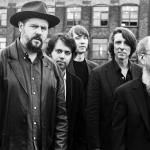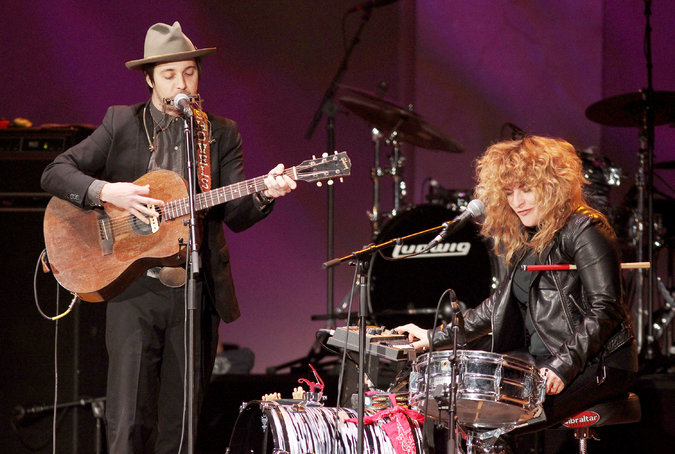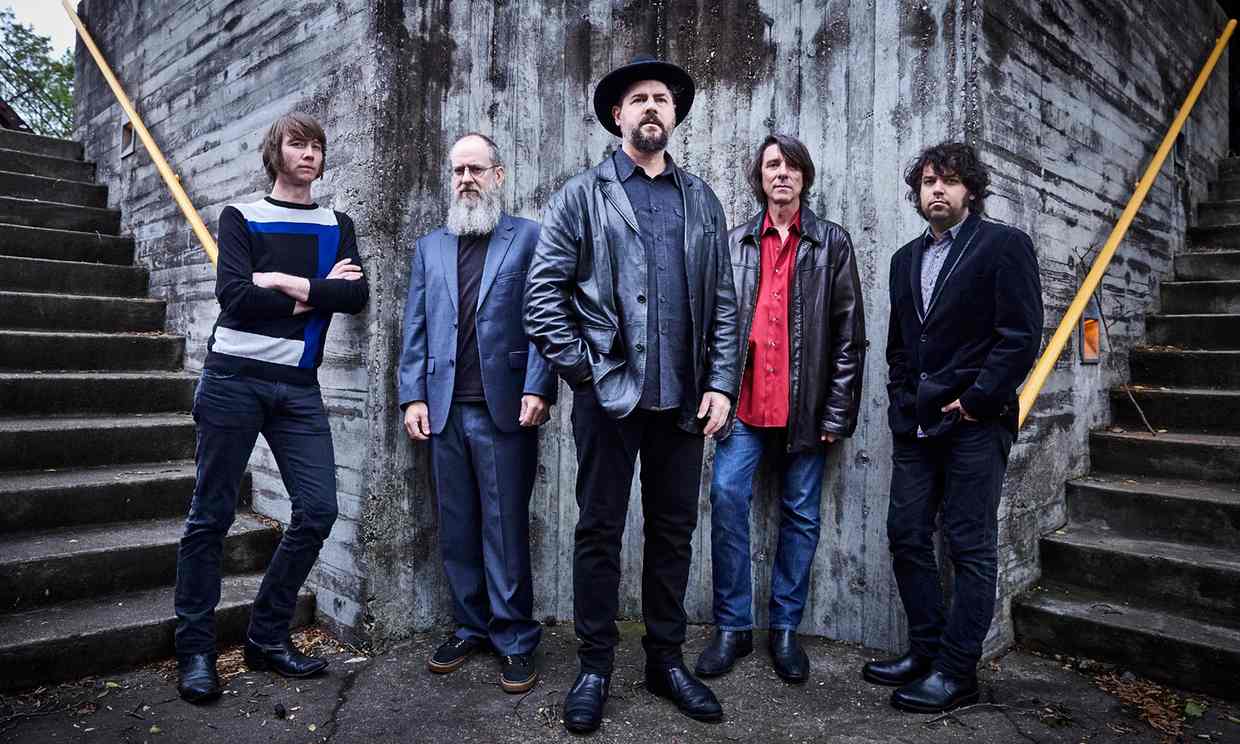By Brett Anderson
October 7, 2016
On the first week of his life as an expatriate southerner, Patterson Hood of the rock band Drive-By Truckers
wrote an essay denouncing the Confederate flag. It was July 2015, and the 52-year-old, who had never lived outside the states of Georgia or his native Alabama, had just moved with his wife and two children to Portland, Ore.
His new home was about as far from the South as Mr. Hood could get without leaving the Lower 48, and the plan was to stop writing so much music about the issues he had obsessed over for decades. But the
massacre at the Emanuel A.M.E. Church in Charleston, S.C., that June drew Mr. Hood back into entrenched disputes over race, region and identity. When Mr. Hood and Mike Cooley, 50, the band's other principle songwriter, started work on what would become their recently released album, "American Band," their left-leaning lyrics were stocked with tales about immigration and guns, blood and burning crosses.
"It's hard to look away right now," Mr. Cooley said of the topical nature of the Truckers' new songs. "What am I going to do, not write this stuff?"
From police treatment of African-Americans to the current presidential election, the issues roiling America today have led the Truckers to drill down on the topic that has preoccupied them for 20 years - the South - while bringing a relatively unheard perspective to pop music's discourse: that of the progressive white Southerner.
And they aren't alone: A few other white Southern groups, like the country-folk duo Shovels & Rope and the soul revivalists St. Paul & the Broken Bones, have started releasing overtly political music that stands with movements like Black Lives Matter. Their work joins passionate voices from the hip-hop and R&B worlds that have been galvanizing fans on a large scale, from
Beyoncé's "Lemonade" to Kendrick Lamar's "To Pimp a Butterfly." On the Drive-By Truckers' new song "What It Means," which was written in response to the shooting of Michael Brown in Ferguson, Mo., Mr. Hood sings, "If you say it wasn't racial when they shot him in his tracks, well I guess that means that you ain't black."
Michael Trent and Cary Ann Hearst, who perform as Shovels & Rope.
Credit Paul Morigi/Getty Images for Blackbird Productions // New York Times
That Mr. Hood and Mr. Cooley regard their Southern legacy as baggage (as opposed to a source of unquestioned pride) has always injected political undercurrents into their take on Southern rock: country-tinged and edged with punk's temper, arena rock's bombast and the craftsmanship of Southern rhythm and blues. But now their counternarrative is aligning with cultural concerns, and "American Band" has landed at a heightened political moment.
SOUTHERN ROCK IS a slippery genre. Its name evokes a preposterously broad sonic terrain, but it is commonly identified with its 1970s standard-bearers like Lynyrd Skynyrd, which emphasized rock's country and blues roots in songs that generally reflected Southern working-class concerns, with ambiguous political affiliations.
But the genre took a conservative turn in the 2000s, as many of Southern rock's best-known artists became surrogates for conservative political interests. A New York Times article about the Southern rock artists playing the 2004 Republican National Convention in New York City was headlined "
G.O.P.'s Southern Strategy? Cranking Up Lynyrd Skynyrd."
The band, or a version of it, famous for its 1973 hit "Sweet Home Alabama" and for flying the Confederate flag onstage, regularly performs in support of conservative politicians, including during the
Republican National Convention in Cleveland in July.
Another conservative musician, Charlie Daniels, is a former Jimmy Carter supporter turned conservative-nationalist firebrand, expressing his disdain for the "flower child president," Barack Obama, in an ad for the National Rifle Association.
Lyrically speaking, Mr. Hood and Mr. Cooley follow in a long tradition of liberal-leaning Southern songsmiths like Johnny Cash, Tom T. Hall and Emmylou Harris. But like those artists, the Truckers and like-minded contemporary Southern musicians, such as Brad Paisley, are still "swimming against the current," said Frye Gaillard, an Alabama songwriter, journalist and historian. Citing as an example the Dixie Chicks' 2003 criticism of President George W. Bush, and the
CD-burning and widespread radio bans that followed, Mr. Gaillard said it still takes "a certain amount of bravery" for Southern musicians to speak their liberal minds.
Mainstream country's conservative fans can still operate like unofficial censors. Last year, radio stations across the country stopped playing Little Big Town's "Girl Crush" after some listeners
complained that it promoted homosexuality. (The song is actually about a heterosexual romance.)
The Truckers found their voice during the period when both Southern rock and mainstream country became increasingly synonymous with white conservative values, seizing on the rich creative potential of an alternate strategy: Southern music that interrogates the South while also embracing it.
"American Band," the Truckers' 11th studio album, arrives 15 years after "Southern Rock Opera," the double-disc record that all but declared the Truckers' official muse as their white Southern identity. The Truckers recorded the new album "when we still didn't think Trump stood a chance of being a nominee," Mr. Cooley said. But as it became apparent that Donald J. Trump was on a path to winning the Republican presidential nomination, the Truckers sped up the album's production schedule to guarantee its appearance in the teeth of the election.
"We're middle-aged, Southern white guys from working-class backgrounds," Mr. Cooley said. Mr. Hood elaborated in a separate interview, suggesting it can be constructively provocative for listeners to hear "a white guy with a heavy Southern accent say `Black Lives Matter.'"
In August, at an outdoor festival in Lexington, Ky., Mr. Cooley sat for an interview, wearing cargo shorts and flip-flops. A Black Lives Matter sign pasted to the front of a keyboard was the band's only stage decoration. He spoke about being particularly angered by the Charleston massacre.
"I found that especially chilling of all the mass shootings simply because of what a young man this shooter was, and how old school that particular act was," Mr. Cooley explained. He recalled what Dylann Roof, the accused Charleston shooter, was believed to have said - "You are raping our women and taking over our country" - to his black victims. "That's old-school, lynch-mob talk."
OVER THE PAST YEAR, the Drive-By Truckers have been joined by other musicians who have the same conflicted feelings about their roots.
Michael Trent and Cary Ann Hearst, the married duo who perform as Shovels & Rope, are native Southerners who live in Charleston and describe themselves as "leftist, modern Southern people." Their first response to the A.M.E. church shootings was to write a song, "BWYR," that they never intended to put on their new album, "Little Seeds." ("BWYR" stands for black, white, yellow, red - an allusion, Mr. Trent said, to the lyrics of the children's song "Jesus Loves the Little Children.") Ms. Hearst said they changed their mind after their manager discovered the song's lyrics on a computer "and reminded us that it was important for us to not be afraid to put the song on the record."
Paul Janeway, frontman for the Alabama soul group St. Paul & the Broken Bones, traces the politically conscious lyrics on his band's new record, "Sea of Noise," to his reading of "Just Mercy," a memoir by the Alabama-based, African-American civil rights lawyer Bryan Stevenson. The book, Mr. Janeway said, moved him to tears.
"It was almost like a religious moment," said Mr. Janeway, 33. "I was like, I have to write a record like this, from a lyrical stance. If I don't, it's not going to mean anything."
These artists are quick to point out that racism is, and always has been, a national problem, not just a Southern one, and they are wary that their speaking out on the subject could be construed to suggest otherwise. As Mr. Cooley put it, "The South is certainly guilty of everything it's charged with" but added that racism "was never uniquely a Southern thing."
The Dexateens, which formed in Tuscaloosa, Ala., just put out "Teenage Hallelujah," an album that opens with "Old Rebel," a song that tweaks Southerners who celebrate the Confederacy.
"People already say that Alabamans are racist," the band's frontman, Elliott McPherson, explained in an interview with
punknews.org. "Why give the rest of the country more ammo to fire at us?"
Lee Bains III, the Atlanta-based leader of the rock band the Glory Fires (and a former Dexateens guitarist), considers his music to be part of a long, pan-racial Southern tradition. "I'd say it goes back to Jimmie Rodgers cutting songs with Louis Armstrong," he said, "to Hank Williams learning guitar from the African-American blues musician Rufus `Tee-Tot' Payne." Mr. Bains and others also credit Southern hip-hop and outlaw country artists for bringing diverse voices from the South to broader attention.
Mr. Bains's raw, guitar-driven music challenges listeners to "come to terms with the wages of sin" that he's grappled with since he discovered, as a child growing up in Birmingham, that his family attended the same Methodist church as Bull Connor, the city's brutally segregationist commissioner of public safety.
MR. HOOD AND MR. COOLEY roughly split the Truckers' songwriting duties. Both grew up in North Alabama, in the area around Muscle Shoals, where an extraordinary number of African-American soul artists recorded significant hits in the '60s and '70s. Mr. Hood's father, the bassist David Hood, played on many of those sessions as part of the Muscle Shoals Rhythm Section.
"My dad was always an unabashed, proud liberal," Mr. Hood said. "He hated George Wallace." Mr. Hood recalled his father saying as much before "he would leave and go to work backing up Wilson Pickett and Aretha Franklin."
The Truckers have never shied from hot-button material. Their first album, "Gangstabilly" from 1998, includes a tribute to a friend who died of AIDS. In 2004, while on tour during the Kerry-Bush race, Mr. Hood said the band was met with jeers when it played "Putting People on the Moon," which is pointedly critical of Ronald Reagan.
"One night in Charlottesville, Va., it got so heated, I thought we were going to have a riot in front of the stage," Mr. Hood recalled. "There were frat boys shooting us birds. I think we ran off a certain part of the fan base over that."
Truckers songs are populated by Southern characters, not caricatures, and they are drawn with an empathy that has brought flattering comparisons to Bruce Springsteen and Southern literary heroes like Flannery O'Connor and Larry Brown. Like all of the group's albums, "American Band" bristles with the love-hate tensions that animate the Truckers' relationship with the South. But Mr. Cooley and Mr. Hood's new songs, including those on the 2014 record "English Oceans," pivot more frequently from the metaphoric to specifically address flash points of the late-Obama political era.
Mr. Hood and Mr. Cooley said they never consider how their chosen subject matter will affect the Truckers' commercial prospects. In varying degrees, the Truckers helped nurture the talents of recent Grammy winners like Alabama Shakes, who Mr. Hood first saw perform at a North Alabama record store, and Jason Isbell, a songwriting member of the Truckers until he left in 2007. But it remains to be seen if those artists' success will pave a path to a larger audience for the Truckers.
Jessie Scott, program director of WMOT-FM, the new 100,000-watt Americana station out of Nashville, said she expects songs from "American Band" to become part of her rotation. Alabama Shakes, Mr. Isbell and St. Paul & the Broken Bones already are.
The Americana format, which could be loosely described as alt-country or Southernish, "has by and large taken a left-leaning political slant," Ms. Scott said. "There are a lot of different flavors under that umbrella. It's not all `my country, right or wrong.'"
The Truckers have never benefited significantly from radio play. Relentless touring has been their most effective means of audience development. The only aspect of the Truckers' performance in Kentucky that appeared controversial was its relative brevity, as mandated by the Moontower Music Festival: barely an hour, or roughly the length of one of the Truckers' more fiery encores.
The band ended its set with an extended cover of Prince's "Sign o' the Times," and the audience members didn't voice any obvious disapproval of the political Truckers songs that came before it. Mr. Hood suggested it wouldn't have mattered if they did.
"This is what we do," Mr. Hood said. "If you like it, great. If you don't like, go see someone else. Go see Charlie Daniels."
The Alabama band known for its sprawling southern rock is squarely in Trump's demographic - but the new album goes against everything he stands for
By Mark Guarino
October 6, 2016
Drive-By Truckers: (left to right) Matt Patton, Brad Morgan, Patterson Hood, Mike Cooley, Jay Gonzalez.
Photograph: Danny Clinch // The Guardian
This tumultuous election season is deserving of a soundtrack, one that captures the chaos of conflicting values that is ripping the country apart at the seams.
Enter
American Band, the 14th album by
Drive-By Truckers that deftly captures the mood of this country over recent years. It's a lean set of songs that serve as an urgent rallying cry against the divisiveness played out on the streets of Ferguson, Baton Rouge and Dallas, but also on the presidential campaign trail where rhetoric has become lighter fluid stoking the flames higher.
Defiant guitar riffs open the album to the story of
Ramon Casiano, the 15-year-old Mexican boy killed by the former head of the National Rifle Association in 1931, and continues with the killing of
Trayvon Martin - "If you say it wasn't racial when they shot him in his tracks / I guess that means you ain't black," Patterson Hood sings on What It Means - as well as revisiting the tensions created by the the endless war on terror and recurring racial violence back home.
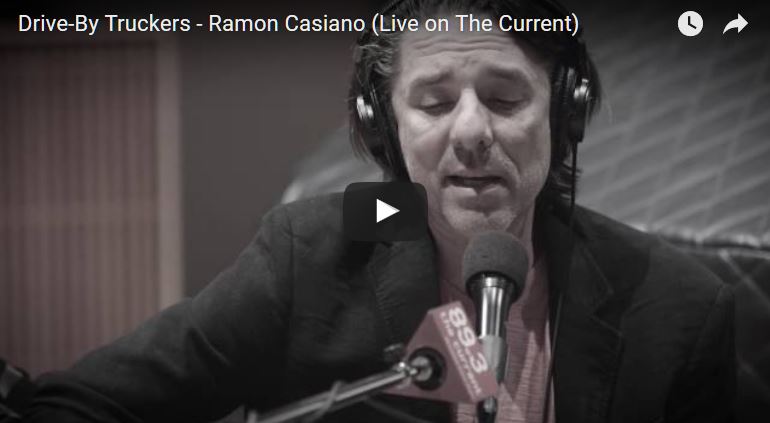
The band has been here before. In 2001 the Truckers laid their claim for immortality with
Southern Rock Opera, a double album that pronounced southern identity as more complex than Confederate flags and racial scorn. Instead, Hood reimagines the southern experience through the eyes of a kid from Alabama who uses music as a conduit to greater things. As the title suggests, the songs are epic, the guitars are plentiful, and the references proudly regional. The album was widely praised, not just for its literate storytelling, but also for how it reclaimed southern rock from the state fair circuit of
Lynyrd Skynyrd cover bands.
"People kept telling us what a terrible idea it was and it would be the end to our promising young career, but it felt right to us. We had a vision it was going to be and we followed it," he says. "Turned out it worked."
Hood, too, is a child of Alabama. He grew up outside of
Muscle Shoals, home to the famed recording studio where his father, David Hood, served as a member the
Muscle Shoals rhythm section, playing bass on hundreds of recordings by Aretha Franklin, the Staple Singers, Etta James, Bobby Womack and Wilson Pickett. At an early age the younger Hood broke from the sports culture of north Alabama and turned to writing for refuge. It ignited a passion for politics. In the third grade he turned in a paper about
Watergate that suggested that President Nixon "should be tarred and feathered and tried for treason". The teacher sent him home.
"To me, the political is personal. Because it's not a sporting event where, at the end of the day, the team clocks out and moves on. There are very real things that that happen," he says.
Yet this album almost didn't. By late 2015 the band planned to take this year off after an extended touring regimen following
English Oceans, their record from the previous year. Hood had relocated his family to Portland while Mike Cooley, his main collaborator, remained in Georgia aiming to write his first solo record. Soon enough the headlines laid both plans to rest: police overreach, street protests, the mainstreaming of the far right. "Songs started coming for both of us," he said. Over three days in November the band cut nine of them; another three days in January finished the job.
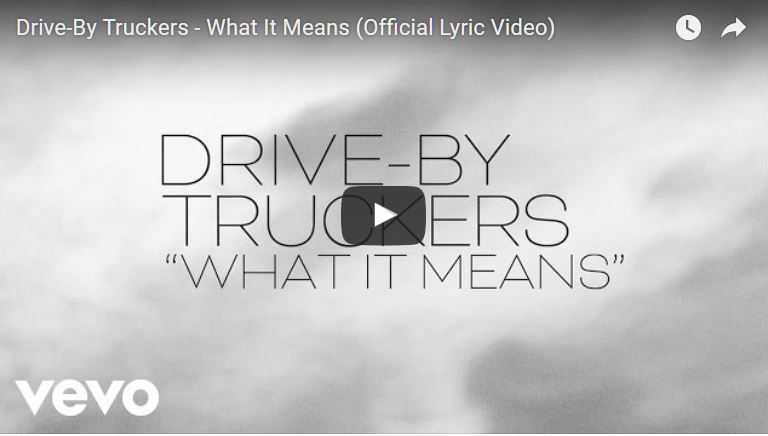
One of the revelations of American Band is how this isn't a record that can be easily plastered on a protest sign or blasted at a rally. The songs go deeper in that they tell stories with human faces and personal testimony. For that reason no other band than this one can claim the mantle to the golden years of Bruce Springsteen. On Ever South, Hood traces his people's journey from Ellis Island to Appalachia where, once tormented as outsiders, they became the tormentors under the revival tent of Christian fervor.
Another song connects the dots back to the fallout from 9/11 when in 2001 Clear Channel Communications, now iHeartMedia, released a list of 165 songs, including John Lennon's Imagine, for a suggested airplay ban because they were "lyrically questionable" in contradicting the thirst for war. On Once They Banned Imagine, Cooley sings of the same frenzy continuing today: "With or against, something been out to get us / and it looked like something finally did."
For a band known for long shows and double albums – a consequence of there being three songwriters in the lineup – American Band is surprisingly lean and concise, with the 11 songs clocking in at about 45 minutes together. That was intentional, Hood says, to cater to the attention spans of those people who need to hear it the most. With so much talk in the media about southern white males clinging to the Republican presidential candidate, Donald Trump, there is a silent caucus representing those, like Hood, who are white middle-aged men in the south who consider him anathema to the republic.
“That is a big reason why this record exists. I am as truly in his demographic as you can get and I don’t want anyone for a second to think that SOB speaks for me,” he says. “Alabama is a red state, but there are people who feel otherwise there. There’s no shortage of people who feel that way, but they’re not the ones being heard because they are not as loud. There needs to be more middle-aged southern dudes saying that black lives matter.”
American Band is also a statement on the state of the Truckers, which, besides Cooley and Hood, include bassist Matt Patton, multi-instrumentalist Jay Gonzalez and drummer Brad Morgan. This is the band’s 20th year and the record is evidence that the urgency the band sparked in its first half thrives today. Much of that has to do with Hood’s 31-year relationship with Cooley that, contentious at times, stands on its contradictory strengths, not just in songwriting but also in musical flourishes, like how Cooley’s guitar spikes Hood’s quieter songs with gnarly guitar licks, and the same in reverse.
The band will tour on the record through late February and then another month in Europe before returning again come summer. By then the US will have a new president, which will make the record more relevant, no matter the outcome. “Our families got back behind this record now, which is wonderful,” Hood says. “That tells us we’re doing something we’re supposed to be doing.”
[Mark Guarino covers national news and culture out of Chicago.]
